春节英语手抄报内容参考资料
- 格式:docx
- 大小:16.49 KB
- 文档页数:6
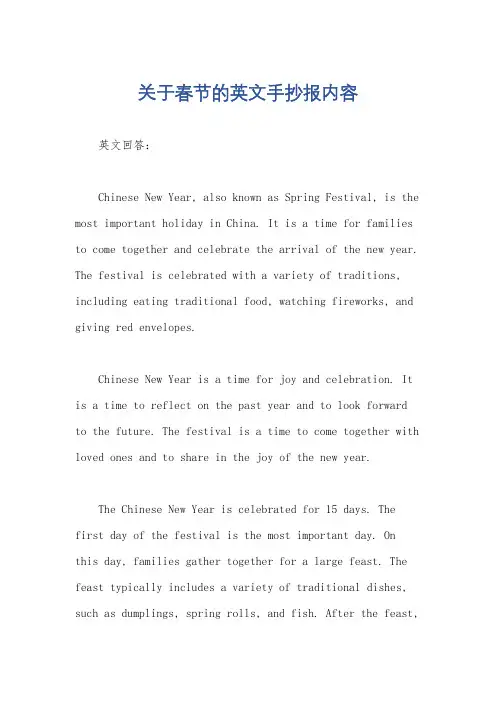
关于春节的英文手抄报内容英文回答:Chinese New Year, also known as Spring Festival, is the most important holiday in China. It is a time for families to come together and celebrate the arrival of the new year. The festival is celebrated with a variety of traditions, including eating traditional food, watching fireworks, and giving red envelopes.Chinese New Year is a time for joy and celebration. It is a time to reflect on the past year and to look forward to the future. The festival is a time to come together with loved ones and to share in the joy of the new year.The Chinese New Year is celebrated for 15 days. Thefirst day of the festival is the most important day. Onthis day, families gather together for a large feast. The feast typically includes a variety of traditional dishes, such as dumplings, spring rolls, and fish. After the feast,families often watch fireworks and give red envelopes to each other.The red envelope is a symbol of good luck and prosperity. The envelopes are typically filled with money, and they are given to children, friends, and family members. The red envelope is a way to wish the recipient a happy and prosperous new year.The Chinese New Year is a time for new beginnings. Itis a time to let go of the past and to look forward to the future. The festival is a time to come together with loved ones and to celebrate the joy of the new year.中文回答:春节是中国最重要的节日,又称农历新年。

英语版春节手抄报内容(有翻译)春节的由来 (The Origin of Spring Festival)春节,又称中国农历新年,是中国最重要的传统节日之一。
据说春节的起源可以追溯到远古时代,当时有一只恶龙威胁着人们的生活。
人们发现,这只恶龙最怕火、噪音和红色,于是大家在除夕之夜点燃篝火、放鞭炮,并贴满红色对联,以驱赶恶龙。
这成为了一个传统,也就是我们今天所庆祝的春节。
春节的习俗 (Traditions of Spring Festival)春节期间,中国有许多特有的习俗,每个习俗都有其独特的意义。
以下是一些常见的春节习俗:1.贴春联 (Paste Spring Festival Couplets):人们会在门上贴上红色的对联,上联写着对联的一句,下联写着对联的另一句。
这些对联通常包含着吉祥的寓意,用来庆祝新年的到来并祈求好运。
2.放鞭炮 (Set off Firecrackers):放鞭炮是春节期间的一个重要活动。
人们相信鞭炮声能够驱赶恶鬼,并带来好运和吉祥。
3.春节晚会 (Spring Festival Gala):春节晚会是中国传统的重要节目之一。
晚会通常包括歌舞表演、相声和杂技等内容,人们可以在家里观看晚会,一起欢度新年。
4.剪纸 (Paper-cutting):剪纸是一种传统的手工艺品和装饰品,用红色纸张剪出各种各样的花纹和形状。
人们将剪纸贴在窗户上,以象征新年的祝福和吉祥。
春节的食物 (Foods of Spring Festival)春节是中国人团聚、庆祝的时刻,人们会享用一些传统的食物来表达对新年的祝福。
以下是一些春节期间常见的食物:1.饺子 (Dumplings):饺子是春节期间最重要的食物之一。
这些小小的馄饨包子象征着财富和团圆,人们相信吃饺子可以带来好运和快乐。
2.年糕 (Rice Cake):年糕是一种由糯米制成的甜点,形状像一个小小的圆柱体。
年糕在春节期间非常受欢迎,人们认为吃年糕可以让生活更甜蜜,年年高升。
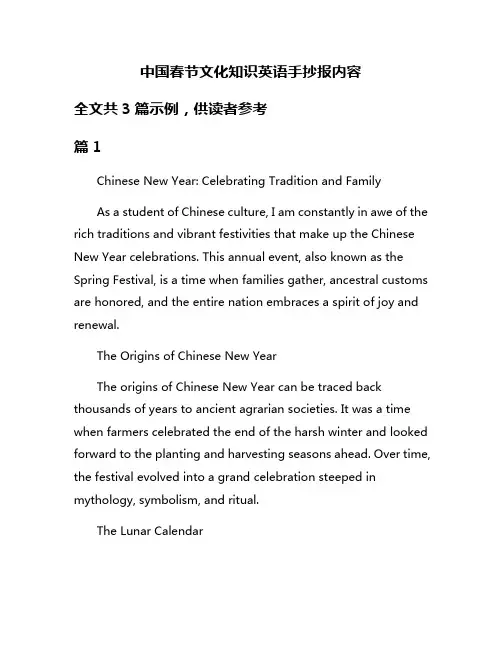
中国春节文化知识英语手抄报内容全文共3篇示例,供读者参考篇1Chinese New Year: Celebrating Tradition and FamilyAs a student of Chinese culture, I am constantly in awe of the rich traditions and vibrant festivities that make up the Chinese New Year celebrations. This annual event, also known as the Spring Festival, is a time when families gather, ancestral customs are honored, and the entire nation embraces a spirit of joy and renewal.The Origins of Chinese New YearThe origins of Chinese New Year can be traced back thousands of years to ancient agrarian societies. It was a time when farmers celebrated the end of the harsh winter and looked forward to the planting and harvesting seasons ahead. Over time, the festival evolved into a grand celebration steeped in mythology, symbolism, and ritual.The Lunar CalendarOne of the most fascinating aspects of Chinese New Year is its adherence to the lunar calendar. Unlike the Gregorian calendar widely used in the West, the Chinese calendar is based on the cycles of the moon. This means that the date of Chinese New Year varies each year, falling somewhere between late January and mid-February.Preparations and TraditionsPreparations for Chinese New Year begin weeks in advance, with families meticulously cleaning their homes to sweep away any ill-fortune and make way for incoming good luck. Homes are also adorned with vibrant decorations, such as red lanterns, paper cuttings, and upside-down fu characters (symbolizing the arrival of happiness and good fortune).One of the most beloved traditions is the reunion dinner on New Year's Eve. Families gather together to enjoy a lavish feast filled with symbolic dishes like dumplings, fish, and nian gao (a sticky rice cake). The meal is a time for families to catch up, exchange well-wishes, and honor their ancestors.Another highlight of Chinese New Year is the practice of giving and receiving red envelopes (hong bao) filled with money. These envelopes, typically given by elders to children andunmarried individuals, are believed to bring good luck and prosperity in the coming year.Fireworks and Lion DancesNo Chinese New Year celebration would be complete without the spectacle of fireworks and lion dances. Fireworks are believed to scare away evil spirits and bring good luck, while the lion dance, performed by skilled dancers in elaborate篇2Chinese New Year: A Vibrant Celebration of Tradition and UnityAs a student deeply interested in cultural exploration, I find the Chinese New Year festival to be a captivating tapestry of age-old customs and modern interpretations. This annual celebration, deeply rooted in the rich heritage of the world's most populous nation, is a time of profound significance, bringing families together and honoring the enduring traditions that have shaped the Chinese identity for centuries.The Lunar New Year, as it is often called, is a movable feast, its date determined by the lunisolar Chinese calendar. Unlike the Gregorian calendar, which follows the solar cycle, the Chinese calendar is based on the phases of the moon, with each monthbeginning on the new moon. This intricate system has been in use for millennia, a testament to the astronomical knowledge and ingenuity of ancient Chinese scholars.One of the most striking aspects of the Chinese New Year is the symbolism that permeates every ritual and decoration. The color red, for instance, is ubiquitous during this period, adorning homes, clothing, and decorations. It is believed to ward off evil spirits and bring good luck, drawing its significance from the Chinese philosophy of yin and yang, where red represents happiness, prosperity, and vitality.The iconic image of the Chinese New Year is undoubtedly the lion dance, a mesmerizing performance that combines acrobatics, music, and choreography. Skilled dancers, clad in vibrant costumes, bring to life the majestic lion, a symbol of power and good fortune. The dance is believed to drive away negative energy and usher in prosperity for the coming year, captivating audiences with its energetic movements and rhythmic drumbeats.Another cherished tradition is the exchange of red envelopes, known as "hongbao," which contain money and are given to children and unmarried individuals by elders and married couples. This act symbolizes the sharing of blessings andgood wishes, encouraging the younger generation to strive for success and uphold family values.Families across China eagerly await the annual reunion dinner, a lavish feast that brings together loved ones from near and far. This sacred gathering is a testament to the importance of family bonds in Chinese culture, where elders are revered and ancestral ties are celebrated. The menu for this meal is meticulously planned, with each dish carrying symbolic significance, such as dumplings representing wealth and longevity noodles symbolizing long life.Beyond the festivities and traditions, the Chinese New Year also serves as a powerful reminder of the resilience and unity of the Chinese people. Throughout history, this celebration has endured through times of hardship and upheaval, providing a sense of continuity and cultural identity that transcends geographical boundaries.As a student, I am in awe of the rich tapestry of traditions that make up the Chinese New Year celebration. From the intricate paper cuttings and lanterns that adorn homes to the vibrant fireworks displays that light up the night sky, every aspect of this festival is a testament to the ingenuity and creativity of the Chinese people.Moreover, the Chinese New Year serves as a bridge between the past and the present, preserving age-old customs while adapting to the changing times. In recent years, technological advancements have allowed for new ways to celebrate, with virtual reunions and online greetings becoming increasingly popular, particularly among the younger generation.Despite these modern influences, the core essence of the Chinese New Year remains unchanged – a celebration of family, tradition, and cultural identity. As I immerse myself in the festivities, I am reminded of the richness and diversity of human cultures, each with its own unique tapestry of beliefs, rituals, and customs.In an increasingly globalized world, where cultures often intermingle and traditions adapt, the Chinese New Year stands as a powerful reminder of the importance of preserving one's heritage while embracing the beauty of diversity. It is a time for reflection, renewal, and a deep appreciation for the shared human experience that transcends borders and unites us all.As I conclude this essay, I am filled with a profound sense of gratitude for having the opportunity to explore and learn about the Chinese New Year. It has broadened my horizons, deepened my understanding of a culture steeped in history and tradition,and reinforced my belief in the power of unity and celebration to bring people together, regardless of their backgrounds.May this festival continue to be a shining beacon of hope, joy, and cultural pride, reminding us all of the enduring strength of the human spirit and the beauty that lies in embracing our differences while celebrating our shared experiences.篇3Chinese New Year Cultural Knowledge in EnglishChinese New Year, also known as the Spring Festival or the Lunar New Year, is the most important traditional festival in China. It's a time for families to reunite, celebrate, and observe various customs and traditions that have been passed down for thousands of years. As a student, I find the cultural richness and symbolic meanings behind this festival fascinating.The Lunar Calendar and Animal ZodiacThe date of Chinese New Year varies each year because it follows the lunisolar Chinese calendar. This calendar is based on the phases of the moon and the sun's longitude. The New Year typically falls between January 21st and February 20th on the Gregorian calendar. Each year is represented by one of the twelve animals in the Chinese zodiac: rat, ox, tiger, rabbit, dragon,snake, horse, sheep, monkey, rooster, dog, and pig. The animal zodiac is deeply ingrained in Chinese culture and is believed to influence one's personality traits and fortunes.New Year's Eve FestivitiesThe eve of Chinese New Year is an incredibly lively and significant occasion. Families gather for a grand reunion dinner, typically featuring dishes like dumplings, fish, and nian gao (a sticky rice cake). The dumpling, with its shape resembling ancient Chinese ingots, symbolizes wealth and prosperity. Fish, with its Chinese pronunciation similar to the word for "surplus," represents abundance and a prosperous year ahead.After the dinner, families stay up late into the night, enjoying each other's company and watching the annual CCTV New Year's Gala, a highly popular variety show featuring performances, skits, and comedy acts. Children receive red envelopes (hongbao) filled with money from their elders as a symbol of good luck and blessings for the coming year.Decorations and TraditionsThe color red is ubiquitous during Chinese New Year, as it symbolizes good luck, happiness, and prosperity. Homes and streets are adorned with red lanterns, couplets (decorative scrollswith auspicious phrases), and upside-down fu characters (representing the arrival of luck and fortune). Families also decorate their homes with blooming plants like kumquats, plum blossoms, and peonies, which signify vitality and new beginnings.One of the most iconic traditions is the setting off of firecrackers, believed to drive away evil spirits and bring good fortune. Lion and dragon dances are also performed in various cities and towns, with skilled dancers maneuvering the vibrant, elaborate costumes to the beat of drums and cymbals.Family Reunions and CustomsChinese New Year is a time for family reunions, with many people traveling long distances to be with their loved ones. During this period, families engage in various customs and rituals. On New Year's Day, children greet their elders by wishing them a happy and prosperous new year (guo nian hao) and receiving hongbao in return.Sweeping or cleaning the house during the first few days of the new year is traditionally avoided, as it is believed to sweep away good luck and fortune. Instead, families enjoy leisure activities, play games, and visit friends and relatives, exchangingwell-wishes and small gifts like seeds, candies, and fruits, which symbolize fertility, sweetness, and prosperity.Food and Its Symbolic MeaningsFood plays a crucial role in Chinese New Year celebrations, with each dish carrying symbolic meanings. Apart from the reunion dinner dishes, other popular foods include:Dumplings (jiaozi): Their shape resembles ancient Chinese ingots, symbolizing wealth and prosperity.Nian gao: A sticky rice cake that signifies a rise in fortune and status.Tangerines and oranges: Their bright orange color and pronunciation (ji) are associated with good luck and wealth.Longevity noodles (changshoulongshou mian): Long noodles symbolize a long and happy life.These foods are not only delicious but also serve as visual representations of the hopes and aspirations for the new year.Cultural Significance and TraditionsChinese New Year is not just a festival; it is a celebration of cultural heritage, family values, and the continuity of traditions. The various customs and rituals observed during this time aresteeped in symbolism and represent the aspirations of the Chinese people for a prosperous, harmonious, and auspicious new year.Beyond the festivities, Chinese New Year also holds deeper cultural significance. It is a time for introspection, renewal, and starting fresh. Families honor their ancestors, pay off debts, and make resolutions for the coming year. The festival embodies the Chinese values of filial piety, unity, and respect for tradition.As a student, I find the rich cultural tapestry of Chinese New Year captivating. It serves as a reminder of the importance of preserving cultural heritage and passing down traditions to future generations. The festival's vibrant celebrations, symbolic foods, and age-old customs are not only a source of joy and togetherness but also a testament to the resilience and enduring spirit of the Chinese people.In conclusion, Chinese New Year is a remarkable festival that showcases the depth and diversity of Chinese culture. Its customs and traditions are deeply rooted in symbolism, superstition, and the desire for prosperity, harmony, and good fortune. As the world becomes increasingly globalized, it is essential to appreciate and preserve these cultural gems,ensuring that the essence of Chinese New Year is passed down for generations to come.。
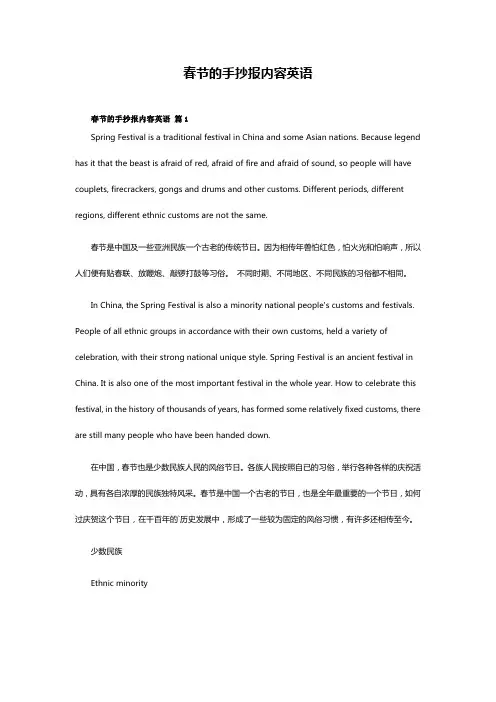
春节的手抄报内容英语春节的手抄报内容英语篇1Spring Festival is a traditional festival in China and some Asian nations. Because legend has it that the beast is afraid of red, afraid of fire and afraid of sound, so people will have couplets, firecrackers, gongs and drums and other customs. Different periods, different regions, different ethnic customs are not the same.春节是中国及一些亚洲民族一个古老的传统节日。
因为相传年兽怕红色,怕火光和怕响声,所以人们便有贴春联、放鞭炮、敲锣打鼓等习俗。
不同时期、不同地区、不同民族的习俗都不相同。
In China, the Spring Festival is also a minority national people's customs and festivals. People of all ethnic groups in accordance with their own customs, held a variety of celebration, with their strong national unique style. Spring Festival is an ancient festival in China. It is also one of the most important festival in the whole year. How to celebrate this festival, in the history of thousands of years, has formed some relatively fixed customs, there are still many people who have been handed down.在中国,春节也是少数民族人民的风俗节日。

myfavouritefestival春节英语手抄报内容My Favorite Festival - Spring Festival1. Introduction:- Spring Festival, also known as Chinese New Year, is the most important traditional festival in China.- It is celebrated on the first day of the Chinese lunar calendar and lasts for 15 days.- It marks the beginning of a new year in Chinese culture.2. Origin and History:- Spring Festival originated from ancient traditions of agricultural societies to celebrate the arrival of spring and pray for a bountiful harvest.- The festival has a history of over 4,000 years and has evolved with the Chinese culture.3. Customs and Traditions:- Red is the dominant color during the festival and symbolizes good luck and happiness. People hang red lanterns, wear red clothes, and decorate their homes with red paper-cuttings.- Family reunion: The festival is a time when families come together to celebrate and enjoy a grand feast. It is often the only time in the year when family members who live far apart can reunite.- Fireworks and firecrackers: To ward off evil spirits and bring good fortune, people set off fireworks and firecrackers during the festival.- Lion and dragon dances: These traditional dances are performed to bring luck and prosperity for the coming year.- Giving red envelopes: Older family members or married couples give red envelopes with money to children and unmarried people to spread blessings and well wishes.4. Food:- Dumplings: Dumplings are considered a must-have food during Spring Festival. They are shaped like ancient Chinese currency, symbolizing wealth and prosperity.- Nian-gao: A sticky rice cake that symbolizes high positions and status in the coming year.- Fish: Chinese word for fish sounds like "surplus," representing abundance and prosperity.- Tangyuan: A sweet rice ball symbolizing family unity and togetherness.5. Cultural Significance:- Spring Festival is not only a time of celebration but also a time to honor ancestors and pay respects to gods.- It reflects the importance of family and emphasizes the values of love, respect, and harmony.- The festival is an opportunity to promote Chinese traditions and cultural heritage.In conclusion, Spring Festival is my favorite festival due to its rich traditions, family reunions, delicious food, and cultural significance. It is a time when joy, happiness, and traditional customs come together, making it truly a special and memorable celebration.。
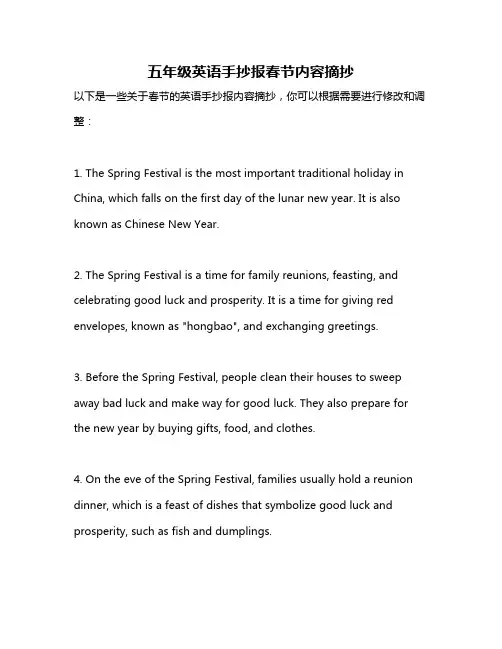
五年级英语手抄报春节内容摘抄以下是一些关于春节的英语手抄报内容摘抄,你可以根据需要进行修改和调整:1. The Spring Festival is the most important traditional holiday in China, which falls on the first day of the lunar new year. It is also known as Chinese New Year.2. The Spring Festival is a time for family reunions, feasting, and celebrating good luck and prosperity. It is a time for giving red envelopes, known as "hongbao", and exchanging greetings.3. Before the Spring Festival, people clean their houses to sweep away bad luck and make way for good luck. They also prepare for the new year by buying gifts, food, and clothes.4. On the eve of the Spring Festival, families usually hold a reunion dinner, which is a feast of dishes that symbolize good luck and prosperity, such as fish and dumplings.5. During the Spring Festival, people visit relatives and friends, exchange greetings, and give red envelopes to children. They also set off fireworks and watch dragon and lion dances to bring good luck and prosperity.6. The Spring Festival is not only a time for family reunions, but alsoa time for new beginnings and good wishes for the future. It is a symbol of Chinese culture and is celebrated by people all over the world.希望这些内容能帮助你完成手抄报,祝你春节快乐!。
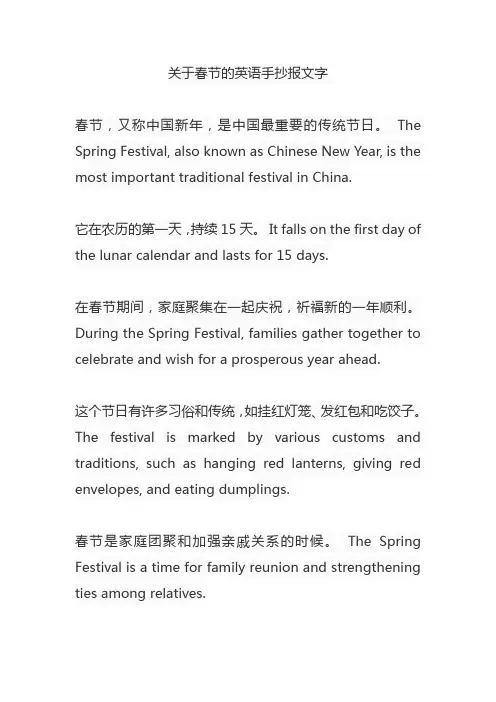
关于春节的英语手抄报文字春节,又称中国新年,是中国最重要的传统节日。
The Spring Festival, also known as Chinese New Year, is the most important traditional festival in China.它在农历的第一天,持续15天。
It falls on the first day of the lunar calendar and lasts for 15 days.在春节期间,家庭聚集在一起庆祝,祈福新的一年顺利。
During the Spring Festival, families gather together to celebrate and wish for a prosperous year ahead.这个节日有许多习俗和传统,如挂红灯笼、发红包和吃饺子。
The festival is marked by various customs and traditions, such as hanging red lanterns, giving red envelopes, and eating dumplings.春节是家庭团聚和加强亲戚关系的时候。
The Spring Festival is a time for family reunion and strengthening ties among relatives.这是一个纪念祖先并在祖坟上祭拜的时刻。
It is a time to honor ancestors and pay respects at ancestral graves.中国人相信春节带来好运,驱散邪灵。
Chinese people believe that the Spring Festival brings good luck and drives away evil spirits.这个节日也是人们放松和享受休闲活动的时候,如观赏舞狮和放烟花。
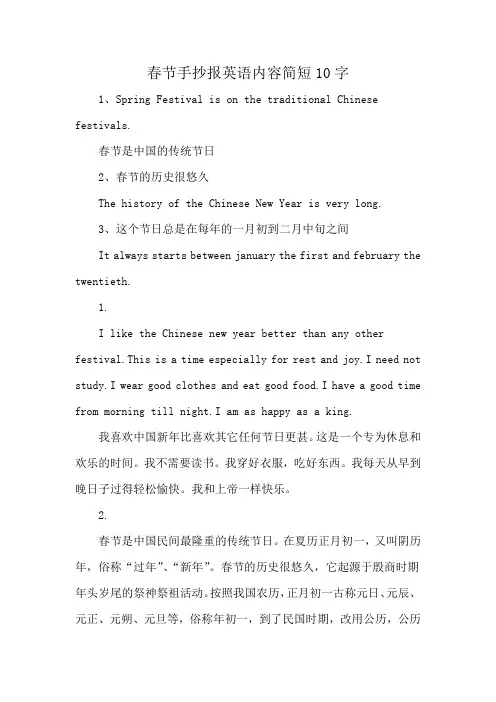
春节手抄报英语内容简短10字1、Spring Festival is on the traditional Chinese festivals.春节是中国的传统节日2、春节的历史很悠久The history of the Chinese New Year is very long.3、这个节日总是在每年的一月初到二月中旬之间It always starts between january the first and february the twentieth.1.I like the Chinese new year better than any other festival.This is a time especially for rest and joy.I need not study.I wear good clothes and eat good food.I have a good time from morning till night.I am as happy as a king.我喜欢中国新年比喜欢其它任何节日更甚。
这是一个专为休息和欢乐的时间。
我不需要读书。
我穿好衣服,吃好东西。
我每天从早到晚日子过得轻松愉快。
我和上帝一样快乐。
2.春节是中国民间最隆重的传统节日。
在夏历正月初一,又叫阴历年,俗称“过年”、“新年”。
春节的历史很悠久,它起源于殷商时期年头岁尾的祭神祭祖活动。
按照我国农历,正月初一古称元日、元辰、元正、元朔、元旦等,俗称年初一,到了民国时期,改用公历,公历的一月一日称为元旦,把农历的一月一日叫春节。
Lunar New Year,the most solemn of traditional Chinese folk festivals.First day of the first lunar month in the traditional Chinese lunar calendar,known as the Moon,commonly known as"New Year"and"New Year."The long history of the SpringFestival,which originated in the Shang period the year draws to a close servicemen and the memorial activities.According to China's Lunar,the first day of the first lunar month yen ancient name,Yuan-chen,a copy,is Emperor,the New Year Day,which is commonly known as Day of the Republic.switch to the Gregorian calendar,the calendar on January 1 as New Year's Day,January 1st called the Lunar Spring Festival.。
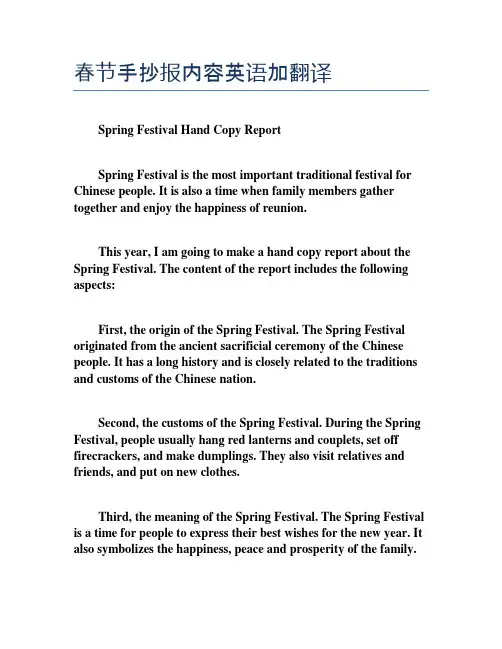
春节手抄报内容英语加翻译Spring Festival Hand Copy ReportSpring Festival is the most important traditional festival for Chinese people. It is also a time when family members gather together and enjoy the happiness of reunion.This year, I am going to make a hand copy report about the Spring Festival. The content of the report includes the following aspects:First, the origin of the Spring Festival. The Spring Festival originated from the ancient sacrificial ceremony of the Chinese people. It has a long history and is closely related to the traditions and customs of the Chinese nation.Second, the customs of the Spring Festival. During the Spring Festival, people usually hang red lanterns and couplets, set off firecrackers, and make dumplings. They also visit relatives and friends, and put on new clothes.Third, the meaning of the Spring Festival. The Spring Festival is a time for people to express their best wishes for the new year. It also symbolizes the happiness, peace and prosperity of the family.Finally, the Spring Festival is also a time to celebrate the harvest of the previous year and look forward to the harvest of the coming year.春节手抄报春节是中国人最重要的传统节日。
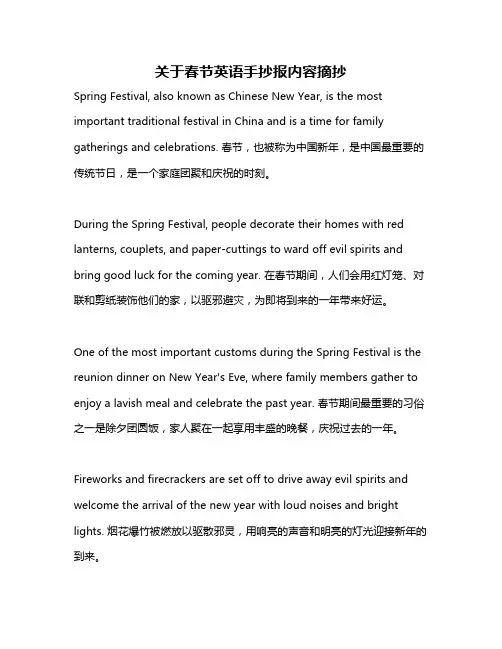
关于春节英语手抄报内容摘抄Spring Festival, also known as Chinese New Year, is the most important traditional festival in China and is a time for family gatherings and celebrations. 春节,也被称为中国新年,是中国最重要的传统节日,是一个家庭团聚和庆祝的时刻。
During the Spring Festival, people decorate their homes with red lanterns, couplets, and paper-cuttings to ward off evil spirits and bring good luck for the coming year. 在春节期间,人们会用红灯笼、对联和剪纸装饰他们的家,以驱邪避灾,为即将到来的一年带来好运。
One of the most important customs during the Spring Festival is the reunion dinner on New Year's Eve, where family members gather to enjoy a lavish meal and celebrate the past year. 春节期间最重要的习俗之一是除夕团圆饭,家人聚在一起享用丰盛的晚餐,庆祝过去的一年。
Fireworks and firecrackers are set off to drive away evil spirits and welcome the arrival of the new year with loud noises and bright lights. 烟花爆竹被燃放以驱散邪灵,用响亮的声音和明亮的灯光迎接新年的到来。
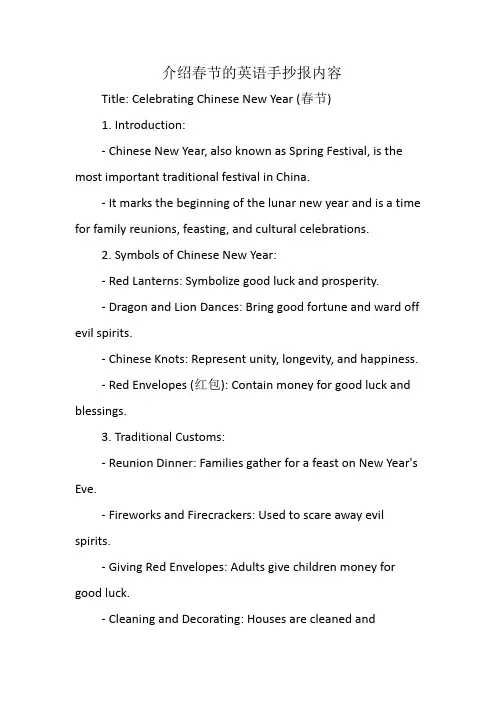
介绍春节的英语手抄报内容Title: Celebrating Chinese New Year (春节)1. Introduction:- Chinese New Year, also known as Spring Festival, is the most important traditional festival in China.- It marks the beginning of the lunar new year and is a time for family reunions, feasting, and cultural celebrations.2. Symbols of Chinese New Year:- Red Lanterns: Symbolize good luck and prosperity.- Dragon and Lion Dances: Bring good fortune and ward off evil spirits.- Chinese Knots: Represent unity, longevity, and happiness.- Red Envelopes (红包): Contain money for good luck and blessings.3. Traditional Customs:- Reunion Dinner: Families gather for a feast on New Year's Eve.- Fireworks and Firecrackers: Used to scare away evil spirits.- Giving Red Envelopes: Adults give children money for good luck.- Cleaning and Decorating: Houses are cleaned anddecorated to welcome the new year.4. Zodiac Animals:- Each year in the Chinese zodiac is associated with an animal.- 2022 is the Year of the Tiger.5. Festive Foods:- Dumplings: Symbolize wealth and prosperity.- Fish: Represents surplus and abundance.- Nian Gao (Sticky Rice Cake): Symbolizes a higher year ahead (年糕).6. Festive Activities:- Temple Fairs: Traditional markets with performances, games, and food stalls.- Lion and Dragon Dances: Colorful performances to bring good luck.- Lantern Festivals: Displays of intricate lanterns in parks and streets.7. New Year Greetings:-“恭喜发财”(Gong Xi Fa Cai): Wishing prosperity and wealth.-“新年快乐”(Xin Nian Kuai Le): Happy New Year!8. Conclusion:- Chinese New Year is a time of joy, tradition, and renewal, bringing people together to celebrate the arrival of a new year full of hope and blessings.Remember: Spring Festival is a time to cherish family, honor traditions, and look forward to a prosperous and auspicious year ahead. Happy Chinese New Year!。
春节英语手抄报IntroductionThe Spring Festival, also known as Chinese New Year, is the most important traditional festival in China. It is celebrated on the first day of the lunar calendar and lasts for 15 days. During this time, families come together to celebrate, and various customs and traditions are observed. In this article, we will explore the origins, customs, and significance of the Spring Festival.OriginsThe origins of the Spring Festival can be traced back thousands of years to ancient Chinese legends and traditions. According to one legend, there was a monster named Nian that would come out on the eve of the lunar new year to terrorize people and their livestock. To protect themselves, the villagers started to put up red decorations, set off firecrackers, and stay up all night. They discovered that Nian was afraid of the color red, loud noises, and fire. Since then, these customs have become an integral part of the Spring Festival celebrations.Customs and Traditions1. Reunion DinnerThe Spring Festival is a time for families to come together. The most important tradition is the reunion dinner, also known as。
春节英语手抄报内容Spring FestivalSpring Festival, also known as Chinese New Year, is the most important traditional festival for the Chinese people. It is a time for family reunions, joy, and celebration.Traditions1.Celebrations: During the Spring Festival, peopledecorate their homes with red lanterns, couplets, andpaper-cuttings to create a festive atmosphere.2.Family Reunions: Families gather together for areunion dinner on New Year’s Eve. This symbolizes unityand prosperity for the coming year.3.Fireworks: Fireworks are set off at midnight toward off evil spirits and welcome the New Year with a bang.Festive Foods1.Dumplings: Symbolizing wealth and prosperity,dumplings are a must-have dish during the Spring Festival.2.Nian Gao: This sticky rice cake is believed to bringgood luck and prosperity for the coming year.3.Fish: Eating fish during the Spring Festivalrepresents surplus and abundance for the upcoming year.Customs1.Red Packets: Elders give red packets filled withmoney to younger family members as a symbol of good luck and blessings.2.Lion Dance: The lion dance is performed to bring good luck and drive away evil spirits.3.New Year’s Wishes: People exchange greetings and well-wishes for the New Year, such as。
春节英语手抄报资料春节,即农历新年,是中华民族最隆重、最热闹的传统佳节。
对于中国人来说,春节承载着无数的情感和记忆,是家庭团聚、欢乐祥和的象征。
以下是为您整理的关于春节的英语手抄报资料,希望能帮助您更好地了解这个重要的节日。
一、春节的起源The Spring Festival has a long history It originated from the worship of gods and ancestors in ancient times According to legend, in the distant past, there was a fierce monster called "Nian" It had a long head and sharp horns, and was very fierce Every New Year's Eve, "Nian" would come out to hurt people and destroy houses Later, people found that "Nian" was afraid of red, fire, and loud noises So, on New Year's Eve, people would stick red couplets on their doors, set off firecrackers, and light lanterns to drive away the monster Gradually, this custom has become a part of the Spring Festival二、春节的时间The Spring Festival falls on the first day of the first lunar month The date varies each year according to the lunar calendar Usually, it is between January 21st and February 20th Before the Spring Festival, people are busy preparing for the celebration They clean their houses, buy new clothes, and prepare delicious food三、春节的传统习俗1、 Cleaning the HouseBefore the Spring Festival, people thoroughly clean their houses to sweep away bad luck and welcome good fortune They clean every corner, wash curtains and beddings, and make the house tidy and clean2、 Buying New Year's GoodsPeople go to the market to buy all kinds of New Year's goods, such as candies, fruits, nuts, and fireworks They also buy new clothes and shoes for the festival3、 Sticking Red CoupletsRed couplets are pasted on the doors of houses The couplets are usually written with auspicious words and express people's wishes for a happy and prosperous new year4、 Setting Off FirecrackersOn New Year's Eve, people set off firecrackers to drive away evil spirits and welcome the new year The sound of firecrackers is deafening, adding to the festive atmosphere5、 Having a Reunion DinnerThe reunion dinner on New Year's Eve is one of the most important traditions Family members gather together to enjoy a sumptuous meal The dishes are usually rich and varied, including fish, which symbolizes surplus and prosperity6、 Giving Red EnvelopesDuring the Spring Festival, adults give red envelopes filled with money to children as a gift and blessing Red envelopes symbolize good luck and happiness7、 Watching the Spring Festival GalaMany families watch the Spring Festival Gala on TV on New Year's Eve The gala features various performances, such as singing, dancing, and comedy sketches, bringing joy and entertainment to people8、 Visiting Relatives and FriendsIn the days following the Spring Festival, people visit relatives and friends, exchange greetings, and give gifts It is a time to strengthen relationships and share happiness四、春节的食物1、 DumplingsDumplings are a musthave food during the Spring Festival They are shaped like ingots and symbolize wealth and good luck2、 Spring RollsSpring rolls are crispy and delicious They are usually filled with vegetables and meat and fried until golden brown3、 FishFish is an important dish during the festival The word "fish" sounds like "surplus" in Chinese, representing abundance and prosperity4、 Sweet Rice BallsSweet rice balls are round and sweet, symbolizing family reunion and happiness五、春节的祝福语1、 Happy Spring Festival! May all your wishes come true and you havea wonderful year ahead!(春节快乐!愿你所有的愿望都能实现,新的一年美好如意!)2、 Good luck and happiness to you in the new year!(新的一年祝你好运连连,幸福满满!)3、 May the new year bring you health, wealth and joy!(愿新的一年带给你健康、财富和快乐!)4、 Wishing you a prosperous and auspicious new year!(祝你新的一年繁荣昌盛,吉祥如意!)六、春节的传说故事There are many interesting legends and stories related to the Spring Festival One of them is about the Kitchen God According to legend, the Kitchen God watches over the family's activities throughout the year and reports to the Jade Emperor on New Year's Eve Before the Kitchen God leaves, people offer him sweet foods to make him speak well of the familyAnother story is about the God of Wealth On the fifth day of the first lunar month, people welcome the God of Wealth to their homes, hoping for wealth and good fortune in the new year七、春节在世界各地With the spread of Chinese culture, the Spring Festival is now celebrated not only in China but also in many other parts of the world In some countries, there are largescale celebrations with lion dances, dragon dances, and cultural performances People of different nationalities come together to enjoy the joyous atmosphere of the festivalIn conclusion, the Spring Festival is a time of joy, reunion, and hope It is a festival that showcases the rich culture and traditions of the Chinese people Whether at home or abroad, the Spring Festival brings people together and fills their hearts with warmth and happiness Let's cherish this wonderful festival and pass on its traditions to future generations。
2024年我的春节英文手抄报内容英文回答:Chinese New Year 2024。
Chinese New Year 2024, also known as the Year of the Dragon, will be celebrated on February 10th. It is a time for family and friends to come together and celebrate the new year.Traditions of Chinese New Year.There are many traditions associated with Chinese New Year. Some of the most popular include:Reunion Dinner: On the eve of Chinese New Year, families gather for a special dinner called the reunion dinner. This dinner is a time to reflect on the past year and to look forward to the year ahead.Fireworks: Fireworks are a popular tradition during Chinese New Year. They are believed to scare away evil spirits and bring good luck.Red Envelopes: Red envelopes are given to children and unmarried adults during Chinese New Year. These envelopes contain money and are a symbol of good luck.Dragon Dance: The dragon dance is a popular tradition during Chinese New Year. It is believed to bring good luck and prosperity.Significance of Chinese New Year.Chinese New Year is a time for family, friends, and celebration. It is also a time to reflect on the past year and to look forward to the year ahead. Chinese New Year is a special time of year for many people around the world.中文回答:2024年春节。
我的春节英语手抄报内容我的春节英语手抄报内容在各领域中,许多人都接触过一些比较经典的手抄报吧,手抄报需要巧妙设计,精心安排。
什么样的手抄报才经典呢?下面是小编为大家整理的我的春节英语手抄报内容,希望对大家有所帮助。
我的.春节英语手抄报内容篇1The Spring Festival,Chinese New Year,is the most important festival for all of us. All family members get together on New Year'Eve to have a big meal.At the same time, everyone celebrates to each other.At about 12 o'clock,some parents and children light crackers.The whole sky is lighted brightly. We may watch the fireworks excitedly.How busy it is!On the first early moring of one year, many senior citizen get up early and they stick the reversed Fu or hang some couplets on the front door. Some house's windows are sticked on red paper cutlings.The Chinese New Year lasts fifteen days. So during the fifteen days, we always visit our relatives from door to door. At that time, children are the happiest because they can get many red packets form their parents,grandparents, uncles, aunts and so on. The last day of the Chinese New Year is another festival. It names the Lantern Festival.So the Chinese New Year comes to the end.我的春节英语手抄报内容篇2The Lunar New Year is a great occasion to the Chinese people. It lasts about the first four days of the year, during which people do not work except for the workers on duty. Students do not go to school, and shops are closed.Several days before the new year, people begin to prepare.Farmers kill pigs, sheep, cocks and hens. City dwellers buy meat fish and vegetables. Houses are cleaned; coupletsare posted on the doors. Colourful lanterns are hung at the gate.On the eve of the new year, each family has its members gatherd together and eats a family reunion dinner. After the meal they watch TV until the clock strickes twelve. Then every family sets off long strings of small firecrackers and other fire works to welcome the new year. On the first day of the new year, almost everyone is dressed in his or her best. When people meet on the way, they say to each other "Happy New Year". Friends and relatives pay new year calls and gives presents to each other. Children indulge themselves in games.我的春节英语手抄报内容篇3In the firecrackers, we ushered in the Chinese people the most grand festival - the Spring Festival, every family beaming, hang red lanterns, labeled red couplets, busy...The first day, the first lunar month is a happy day.Morning, golden sun with earth, the sun began to work the yawn.In the past I got up late, but today I for a first, because want to smell the aroma of food flavor. A string of lit firecrackers in the hands of people, sounds really big, splash around, as if to send every blessing to every household, successive waves of fireworks, scratching, very busy.After lunch, uncle, aunt came to grandma's. Drops drops... Who is coming? We stretch the neck looks around. Oh! It was a big aunt. They are out of the car and went into the house.Put away the baggage, two aunt began to help grandma and grandpa to prepare dinner.我的春节英语手抄报内容篇4In the New Year, my friends are changed into the new clothes take off the old clothes. In people look forward to every day, New Year's day finally came, people began to busy. Buy fireworks small stall out doing business; Buy confectionery out doing business; Buy everyone couplet is out of business. We took to the streets to purchase them, a seething streets.That night, whether there will be a few families put fireworks lit into heaven; Sometimes there are several naughty kids do not help, holding a small firecrackers, threw it into the ground, and of the earth in pain bi BiBao peel. Families to turn on the lights, and some people are watching TV, some family reunion dinner again; I with mom and dad said jokes, stories, watch TV, I immediately to mind a poem: firecrackers in New Year's eve, the spring breeze gifts into the toso. Always find Tong T ong, brought new peach in old character.我的春节英语手抄报内容篇5The Spring Festival! The Spring Festival! Every household blissfully unaware.My home is not exceptional also, my house with a beautiful Spring Festival couplets, window stickers, or pattern of the rabbit!The day of the year 30, at four o 'clock in the afternoon, we all ready to go out to dinner. Before leaving the mother call I write wishes on the red envelopes, grandpa likes sports lottery tickets, I will write on grandpa's red envelopes: wish grandpa lottery prize; Grandpa love playing mahjong, grandpa I will write on the envelope: wish grandpa mahjong table to make more money; Grandma and grandma I write I wish them good health! At the dinner table, I for mother give red envelopes to old people, adults also gave me lucky money, the adults wish me a happy New Year, learning progress, to the next level!Shining words of blessing, she thanks hovering in the ear, my heart warm warm, sweet.我的春节英语手抄报内容篇6Around New Year's day, let a person find everything new and fresh, the streets decorated lanterns are everywhere, though not the Spring Festival, but people wear their own clothes or new clothes, I am no exception, beaming down the street, I have to happy, the street is so busy, people heel touch your toes, crowded crowded came to XDX square, wow! Mouth quickly became O glyph, the people there are countless, it surprised me! On our way of talking and laughing at noon.Suddenly, my heart is like the sea waves of joy - turned out to be a McDonald's. Was so happy in my heart, can not use one word to describe. Saw McDonald's saliva poured out, and it is endless! Begins barking belly also, "goo - goo" everyone was amazed to laugh, and laugh, this is lose face. At noon I to enjoy my dream of McDonald's, hey hey! I seem a little smug happynewyear...我的春节英语手抄报内容篇7This Year's Eve, Peach Blossom Village, young people are the mountain refuge, from a village outside begging the elderly, saw hiscrutches, arm ride capsule bag, silver to be graceful, head if Lang stars.Some villagers sealed windows locked, and some to pack up and get some Thunbergia sheep, everywhere people shouting, scene of a panic rush.At this time, who determined to take care of the elderly people begging. Village head only an old lady to the elderly more food, and urged him to speed up the mountain to escape the "Year" beast, the old man smiled stroking beard: mother-in-law ifI stay at home one night, I have the "year" removed the animal. Head scared the old lady look at, to see him mental healthy, bearing out of the ordinary.She is still continuing to persuade, begging people laugh instead of the phrase. Mother-in-law no option but to leave home and go up the mountain refuge.我的春节英语手抄报内容篇8There"s no place like home for the holidays.在这佳节里,没有比家更好的地方了。
英语春节手抄报内容短句子当然可以,以下是一些关于春节的英语短句子,你可以在手抄报上使用:1. "Spring Festival is the most important traditional holiday in China, marking the end of winter and the beginning of the lunar new year."2. "Families come together during the Spring Festival to feast, give red envelopes (hongbao), and watch dragon and lion dances."3. "The Spring Festival is a time for renewal, good fortune, and the fervent hope for a prosperous year."4. "In Chinese culture, the Spring Festival is a time for reflection, honoring ancestors and making wishes for the future."5. "The atmosphere during the Spring Festival is filled with joy, hope, and the belief that good luck is on its way."6. "As the clock strikes midnight on Chinese New Year's Eve, families gather around the table for a reunion dinner known as 'Nian Ye Fan'."7. "The custom of giving red envelopes is a symbol of luck and good wishes during the Spring Festival."8. "The dragon dance and lion dance are traditional performances during the Spring Festival, bringing luck and prosperity to families."9. "As the Spring Festival nears, the city streets become adorned with red paper cutouts and bright lanterns, creating an atmosphere of celebration."10. "The Spring Festival is not only a time for family reunions but alsoa celebration of Chinese culture, tradition, and values."希望这些短句子可以帮助你完成手抄报。
春节英语手抄报内容参考资料 春节俗称“年节”,是中华民族最隆重的传 欢度春节统佳节。自汉武帝太初元年始,以夏年(农历)正月初一为“岁首”(即“年”),年节的日期由此固定下来,延续至今。年节古称“元旦”。1911年辛亥革命以后,开始采用公历(阳历)计年,遂称公历1月1日为“元旦”,称农历正月初一为“春节”。 岁时节日,亦被称为“传统节日”。它们历史悠久、流传面广,具有极大的普及性、群众性、甚至全民性的特点。年节是除旧布新的日子。年节虽定在农历正月初一,但年节的活动却并不止于正月初一这一天。从腊月二十三(或二十四日)小年节起,人们便开始“忙年”:扫房屋、洗头沐浴、准备年节器具等等。所有这些活动,有一个共同的主题,即“辞旧迎新”。人们以盛大的仪式和热情,迎接新年,迎接春天。 年节也是祭祝祈年的日子。古人谓谷子一熟为一“年”,五谷丰收为“大有年”。西周初年,即已出现了一年一度的庆祝丰收的活动。后来,祭天祈年成了年俗的主要内容之一。而且,诸如灶神、门神、财神、喜神、井神等诸路神明,在年节期间,都备享人间香火。人们借此酬谢诸神过去的关照,并祈愿在新的一年中能得到更多的福佑。年节还是合家团圆、敦亲祀祖的日子。除夕,全家欢聚一堂,吃罢“团年饭”,长辈给孩子们分发“压岁钱”,一家人团坐“守岁”。元日子时交年时刻,鞭炮齐响,辞旧岁、迎新年的活动达于高潮。各家焚香致礼,敬天地、祭列祖,然后依次给尊长拜年,继而同族亲友互致祝贺。元日后,开始走亲访友,互送礼品,以庆新年。年节更是民众娱乐狂欢的节日。元日以后,各种丰富多彩的娱乐活动竞相开展:耍狮子、舞龙灯、扭秧歌、踩高跷、杂耍诸戏等,为新春佳节增添了浓郁的 欢度春节喜庆气氛。此时,正值“立春”前后,古时要举行盛大的迎春仪式,鞭牛迎春,祈愿风调雨顺、五谷丰收。各种社火活动到正月十五,再次形成高潮。 因此,集祈年、庆贺、娱乐为一体的盛典年节就成了中华民族最隆重的佳节。而时至今日,除祀神祭祖等活动比以往有所淡化以外,年节的主要习俗,都完好地得以继承与发展。春节是中华民族文化的优秀传统的重要载体,它蕴含着中华民族文化的智慧和结晶,凝聚着华夏人民的生命追求和情感寄托,传承着中国人的家庭伦理和社会伦理观念。历经千百年的积淀,异彩纷呈的春节民俗,已形成底蕴深厚且独具特色的春节文化。近年来,随着物质生活水平的提高,人们对精神文化生活的需求迅速增长,对亲情、友情、和谐、美满的渴求更加强烈,春节等传统节日越来越受到社会各界的重视和关注。要大力弘扬春节所凝结的优秀传统文化,突出辞旧迎新、祝福团圆平安、兴旺发达的主题,努力营造家庭和睦、安定团结、欢乐祥和的喜庆氛围,推动中华文化历久弥新、不断发展壮大。 翻译:the spring festival known as "festival", ()the chinese nation is the most solemn preach to celebrate the spring festival holiday series. since the first year of emperor the beginning, beginning with summer years (the lunar) for the first day of the first month "at" (the "year"), the date of the festival this fixed down, continue today. festival times, "new year's day". 1911 years after the revolution, began to the gregorian calendar (gregorian calendar) jinian, hence say calendar january 1 as "new year's day", said the first day of the lunar year for "spring festival". when old festival, also known as "traditional festival". they has a long history, spread wide, for great popularity, mass,
even the characteristics of honor. the day of the festival is chujiubuxin. although the festival for the first day of the lunar year, but the festival's activities but and more than the first day of the first month this day. from the twelfth 23 (or 24) small festival on, people began to "busy" houses, shampoo and bath, and preparing for the festival appliances, etc. all of these activities, there is a common theme, namely "special". people with big ceremony and enthusiasm to greet the new year, and meet the spring. festival is also offering wish the day of prayer. the ancients refers to a ripe for 一“ millet in ", the grain harvest for "a year". early zhou dynasty, that has emerged of the celebration of the annual harvest activities. later, actually became the prayer in the main contents of the call. and, such as kitchen, goalkeeper, mammon, like god, jingshen as the way the gods, during the festival, and earth for incense. people like to take this opportunity to thank the gods of the attention, and wishes for in a new year can get more bliss. festival or family reunion, the days of king diyi kiss, fathers. the new year's eve, the family gathered, eat "reunion dinner", the elder give children distribute "lucky money", the family tuanzuo "shou sui". yuanri son/years time, firecrackers neat ring, resigned, the activities of the old new year up to the climax. a salute to his burning incense, and heaven and earth, and the chief fathers, and in turn give thine elder new year, and to congratulate each other wayward relatives and friends. yuan in the future, starts to go visit family and friends, gift giving, to a new year. festival but also people entertainment gala day. yuanri later, all sorts of rich and colorful entertainment to carry out activities: play the lion, wulongdeng, stilted, juggling the yangge dance, theatre, in new year spring festival to celebrate the spring festival add rich festival atmosphere. at this point, is worth "year" before, during and after t
he winter days will have a big ceremony, niuyingchun whip a wish for the good, the grain harvest. all kinds of activities to jan on january 15, once again, the formation of upsurge. therefore, the collection prayer, congratulations, the entertainment is a body festival festival became the most grand holiday of the chinese nation. and today, in addition to offer a sacrificial activities such as god than ever before to fade beyond, the festival's main custom, are in good condition to inheritance and